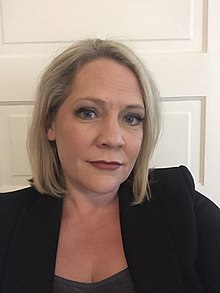Angela Rasmussen
Angela Rasmussen | |
|---|---|
 | |
| Born | Angela Lynn Rasmussen |
| Nationality | American |
| Education |
|
| Spouse | Alexei Krasnoselsky |
| Scientific career | |
| Fields | Virology |
| Institutions | |
| Thesis | Development of a Mouse Model of Rhinovirus Infection (2009) |
| Doctoral advisor | Vincent Racaniello |
| Website | angelarasmussen |
Angela Lynn Rasmussen is an American
Education and early career
During graduate school, Rasmussen worked in the laboratory of Vincent Racaniello where she developed a mouse model of rhinovirus infection in order to better understand the pathogenesis of illnesses caused by the virus, such as the common cold.[2]
Research
Rasmussen joined the faculty at Columbia University Mailman School of Public Health, where she worked as an associate research scientist. There, she studied how hosts respond to infectious diseases like SARS and Ebola.[3]
Ebolavirus research
During her tenure at
Rasmussen continued work on understanding genetic susceptibility with Ebola at
COVID-19 work
Rasmussen's work investigating the heterogeneity in Ebola infections has translated into developing hypotheses around why some COVID-19 cases are worse than others.[11]
She has also been on the frontlines of communication around the novel coronavirus and COVID-19, applying her expertise in correspondence with the popular press to interpret preliminary results around how long immunity to the virus may last, how effective potential drugs may be in treating the disease, and whether biological sex plays a role in the severity of the disease.[12][13][14] Given the breakneck pace at which preliminary research results have been released—for example, through preprints—she has urged caution in reporting research findings too quickly and without the proper caveats to ensure the public is not misinformed.[15]
Advocacy
Rasmussen has served on a National Institutes of Health working group on "Changing the Culture to End Sexual Harassment" in biomedical research fields.[16] She formerly served on the leadership of the organization MeTooSTEM, before stepping down in February 2020 due to concerns with the organization's leadership and allegations of abuse.[17][18]
References
- ^ "Dr. Angela Rasmussen". Dr. Angela Rasmussen. Retrieved 2021-04-27.
- PMID 21943827.
- ^ Walsh, James D. (2020-01-31). "How Worried Should We Be About Coronavirus?". Intelligencer. Retrieved 2020-04-01.
- ^ a b "Modeling Ebola in Mice". The Scientist Magazine®. Retrieved 2020-03-31.
- ^ Feltman, Rachel (2014-10-13). "Can your genes affect your response to Ebola? That's the case in these mice". Washington Post. Retrieved 2020-04-01.
- ^ "Genes 'play role in Ebola survival'". BBC News. 2014-10-31. Retrieved 2020-04-01.
- ^ Ziv, Stav (2014-10-30). "Why Do Some Die From Ebola and Others Survive?". Newsweek. Retrieved 2020-04-01.
- ^ "Ebola Virus Response Signature Emerges From Mouse Gene Expression Data". GenomeWeb. 11 February 2020. Retrieved 2020-04-01.
- PMID 28331091.
- ^ "Silence is golden: Suppressing host response to Ebola virus may help to control infection". ScienceDaily. Retrieved 2020-04-01.
- ^ "Why Some COVID-19 Cases Are Worse than Others". The Scientist Magazine®. Retrieved 2020-04-01.
- ^ "Monkeys Develop Protective Antibodies to SARS-CoV-2". The Scientist Magazine®. Retrieved 2020-04-01.
- ^ Mooney, Chris; Rolfe, Pamela (2020-03-26). "Men are getting sicker, dying more often of covid-19, Spain data shows". Washington Post. Retrieved 2020-04-01.
- PMID 32229574.
- ^ "Here's what coronavirus does to the body". Science. 2020-02-18. Archived from the original on February 14, 2020. Retrieved 2020-04-01.
- ^ "ACD Working Group on Changing the Culture to End Sexual Harassment". NIH Advisory Committee to the Director. Retrieved 2020-03-31.
- ^ "The Leading #MeToo Activist Group In Science Is In Turmoil After More Leaders Resign". BuzzFeed News. 22 February 2020. Retrieved 2020-03-31.
- ^ Wadman, Meredith (2020-03-02). "Update: MeTooSTEM board members stand by embattled founder". Science | AAAS. Retrieved 2020-03-31.
External links
- Official website
- Angela Rasmussen publications indexed by Google Scholar
